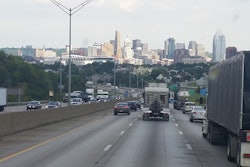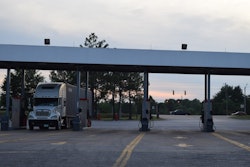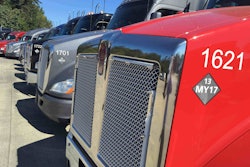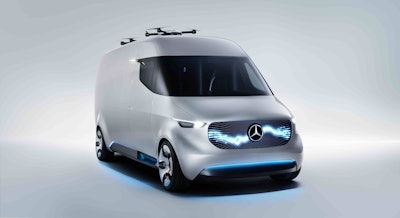 Mercedes-Benz Vision Van
Mercedes-Benz Vision VanThe future of freight delivery is changing and the heavy duty segment isn’t the only place where automation is becoming trendy.
Wednesday, Mercedes-Benz Vans announced its adVANce initiative, which calls for – among other things – the development of a connected all-electric vehicle for last-mile delivery in urban and suburban environments.
Mercedes-Benz Vans boss Volker Mornhinweg says for adVANce, the company identified three fields of action: connectivity, hardware-based solutions and mobility.
“With the Vision Van from Mercedes-Benz Vans we provide an idea of future generations of vans: the intelligent automation technology connects the entire process, from loading and transportation by road through to delivery to the consignee,” he says. “This makes it easier for the deliverer to do business and rapidly reduces the delivery time for end customers.”
Connectivity integrates smart technologies into the van, which Mornhinweg says increases its efficiency and makes it a central component of the digital value chain. One example is developing a telematics unit for vans which collects and processes data concerning the status of the delivery tour, the present location and the load, and sends this information to the distribution manager. In this way it is possible to monitor and manage last-minute changes within the fleet efficiently from a central point.
“The van of the future will be a connector,” he adds.
Through innovative hardware-based solutions, Mercedes-Benz Vans is working on automated cargo space systems for delivery vehicles.
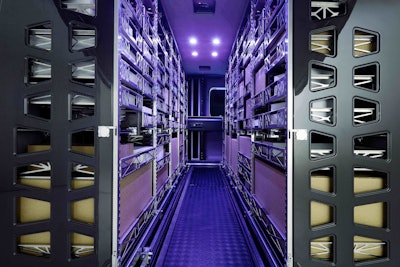 Mercedes-Benz Vision Van features an intelligent cargo space.
Mercedes-Benz Vision Van features an intelligent cargo space.Until now, Mornhinweg says, delivery drivers need to rearrange their packages – on average around 180 per load – 10 times while making deliveries within a residential area and schedule approximately three to four minutes per stop.
A new, interconnected cargo space system makes loading and unloading much faster, thanks to loading the vehicle with all pre-picked parcels in one go, which cuts loading times considerably and reduces the amount of vehicle downtime at distribution centers. When the deliverer is unloading, the system will show him the exact load configuration and make the right package available at the right time for delivery depending on the delivery destination, Mornhinweg adds. The team at Mercedes-Benz Vans also has the integration of autonomous delivery systems such as drones or self-driving robots in mind.
To boost mobility, Mercedes-Benz Vans is also working on on-demand leasing, rental and sharing models tailored to the needs of van customers. In the future, Mornhinweg says the intelligent networking of technologies can make the transportation of goods more efficient and considerably improve transport on the last mile.
Mercedes-Benz Vans has organized a new business unit called Future Transportation Systems with project teams of 200 employees based within the start-up scene in Stuttgart, Berlin and Silicon Valley.
The company is also investing in several innovative start-ups in the areas of automation, robotics and mobility services, including a stake in Matternet, a U.S.-based developer of autonomous drone logistics systems. Together with Matternet, Mercedes-Benz Vans worked on the Vision Van show car, the first integrated delivery system that automates last-mile delivery. The new system, which combines van and drone logistics, is a more efficient, faster and a more economical way for people to receive goods on-demand.
The company is also slated to invest approximately $562 million over the next five years for digitalization, automation and robotics in vans as well as innovative mobility solutions.

